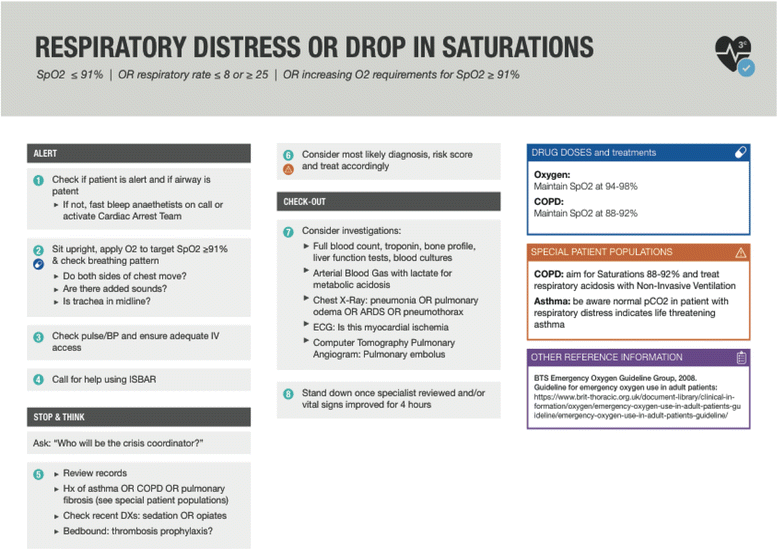Crisis checklists for in-hospital emergencies: expert consensus, simulation testing and recommendations for a template determined by a multi-institutional and multi-disciplinary learning collaborative
- PMID: 28482890
- PMCID: PMC5422971
- DOI: 10.1186/s12913-017-2288-y
Crisis checklists for in-hospital emergencies: expert consensus, simulation testing and recommendations for a template determined by a multi-institutional and multi-disciplinary learning collaborative
Abstract
Background: 'Failure to rescue' of hospitalized patients with deteriorating physiology on general wards is caused by a complex array of organisational, technical and cultural failures including a lack of standardized team and individual expected responses and actions. The aim of this study using a learning collaborative method was to develop consensus recomendations on the utility and effectiveness of checklists as training and operational tools to assist in improving the skills of general ward staff on the effective rescue of patients with abnormal physiology.
Methods: A scoping study of the literature was followed by a multi-institutional and multi-disciplinary international learning collaborative. We sought to achieve a consensus on procedures and clinical simulation technology to determine the requirements, develop and test a safe using a checklist template that is rapidly accessible to assist in emergency management of common events for general ward use.
Results: Safety considerations about deteriorating patients were agreed upon and summarized. A consensus was achieved among an international group of experts on currently available checklist formats performing poorly in simulation testing as first responders in general ward clinical crises. The Crisis Checklist Collaborative ratified a consensus template for a general ward checklist that provides a list of issues for first responders to address (i.e. 'Check In'), a list of prompts regarding common omissions (i.e. 'Stop & Think'), and, a list of items required for the safe "handover" of patients that remain on the general ward (i.e. 'Check Out'). Simulation usability assessment of the template demonstrated feasibility for clinical management of deteriorating patients.
Conclusions: Emergency checklists custom-designed for general ward patients have the potential to guide the treatment speed and reliability of responses for emergency management of patients with abnormal physiology while minimizing the risk of adverse events. Interventional trials are needed.
Keywords: Crisis; Learning Collaborative; Patient safety; Rapid response teams; Reliability; Simulation.
Figures

References
-
- Lee A, Bishop G, Hillman KM, Daffurn K. The Medical Emergency Team. Anaesth Intensive Care. 1995;23(2):183–186. - PubMed
-
- Kohn LT, Corrigan JM, Donaldson MS, editors. Institute of Medicine (US) Committee on Quality of Health Care in America; To Err is Human: Building a Safer Health System. Washington (DC): National Academies Press (US); 2000. - PubMed
MeSH terms
LinkOut - more resources
Full Text Sources
Other Literature Sources

